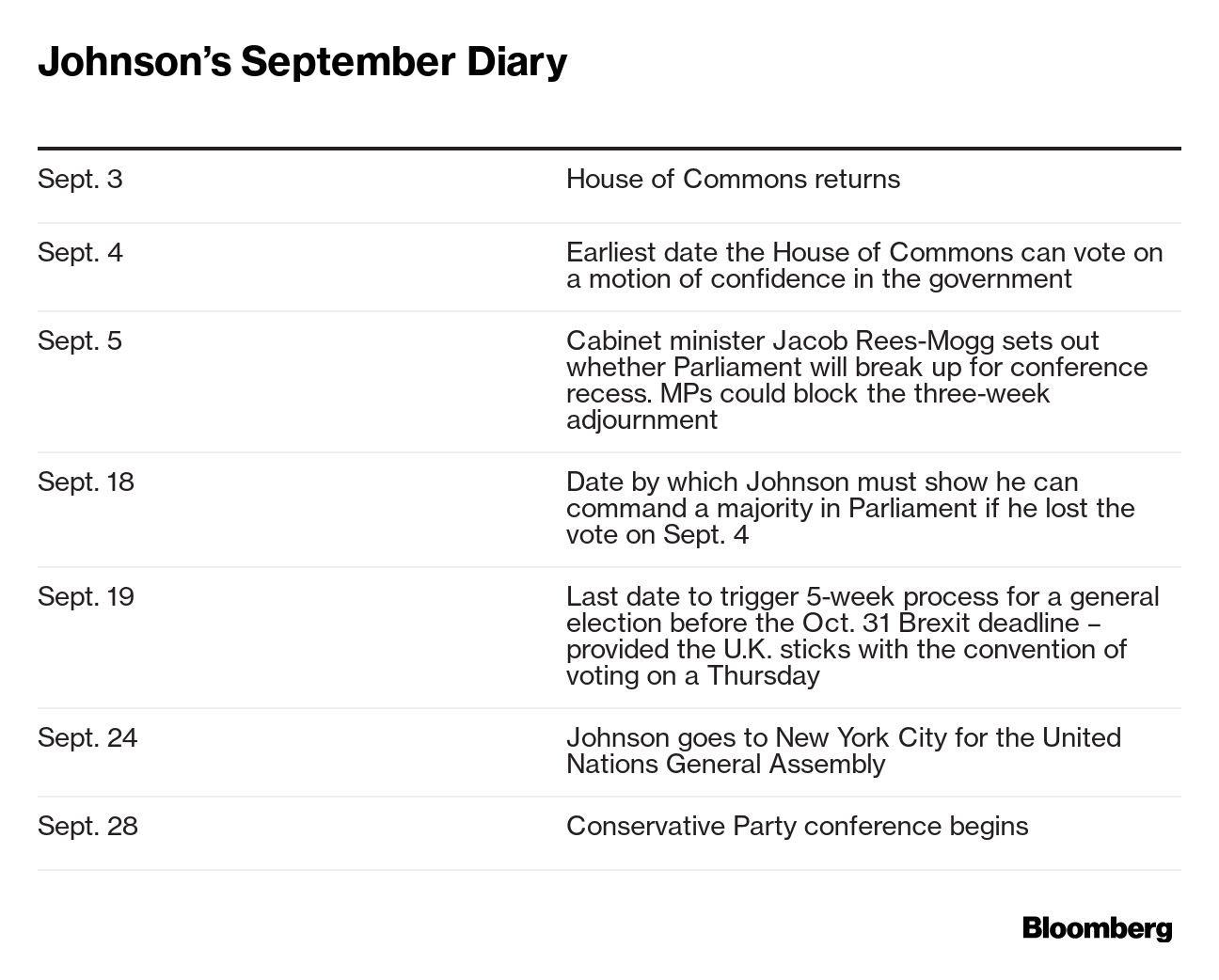(Bloomberg) -- Labour leader Jeremy Corbyn signaled he’ll call a vote of no-confidence in Boris Johnson’s government when Parliament returns in September to prevent the new prime minister taking Britain out of the European Union without a deal.
Corbyn said he will put down a motion at an “appropriate very early time,” after Parliament returns on Sept. 3.
“The prime minister seems to be trying to slip no-deal through, slip past Parliament and slip past the British people,” Corbyn told reporters in Derbyshire, northern England, Monday. “No-deal will be really serious; serious for food prices, for medical supplies, for trade, for investment.”
Corbyn could put down a motion of no-confidence as soon as Parliament returns. He has to act fast if he wants to bring down the government -- or force it to abandon its threat to leave the EU without a deal -- before Johnson’s deadline of Oct. 31.
The European Union is watching developments in London as it weighs how to handle Johnson, who says he wants a new Brexit agreement but is prepared to walk away without one, despite the economic chaos it would bring. Germany doesn’t expect Johnson to make good on his no-deal threat and expects Parliament to stop him, according to two government officials in Berlin, potentially weakening the U.K.’s negotiating hand.
Digging In
The 27 EU states showed no sign of giving in to Johnson’s demands when officials met in Brussels on Monday. Representatives reaffirmed their position that the Brexit agreement can’t be re-opened, according to a person familiar with the discussion.
If Labour wins a no-confidence vote, which could be held as soon as Sept. 4, Johnson would then have 14 days to try to command a majority in the House of Commons. If he wasn’t able to then he might be forced to call a general election, something he said again on Monday he doesn’t want to do.
Even so, a general election might not be enough to prevent a no-deal exit. The Sunday Telegraph reported that Johnson’s senior adviser Dominic Cummings told aides that Johnson could delay calling the election until after Oct. 31, allowing Britain to tumble out of the bloc by default in the meantime.
That throws up another set of problems, according to Ruth Fox, Director at the Hansard Society. Having lost a confidence vote in his government, Johnson would effectively be a caretaker leader, limited in what he can instruct the civil service to do under purdah rules governing general elections.
Any attempt to push through a no-deal Brexit while not supported by the House of Commons would put Johnson on a legal and constitutional collision course. And in those circumstances there would be a legal question mark over what Johnson could do, both in initiating policy and in the use of government resources, particularly if the policy of the opposition party -- which might win an election -- stands counter to his government’s policy.
‘High-Risk Strategy’
“The Cummings strategy works if they are prepared to blow through lots of constitutional conventions,” Fox said in an interview. “It’s a very, very high-risk strategy.”
During the 14-day period after a confidence vote, there would be trading between the parties to see if a new government could be formed. The Scottish National Party may seek a second referendum on Scottish independence as a price for propping up a potential Labour government, while the Welsh nationalists of Plaid Cymru list a second public vote on Brexit as their top priority. The Liberal Democrats also want a second referendum.
A government of national unity aimed at preventing a no-deal Brexit could conceivably unite Conservative rebels, independents and opposition parties, but with no obvious leader and party machinery, it would be difficult to get off the ground.
(Updates with EU position in sixth paragraph.)
